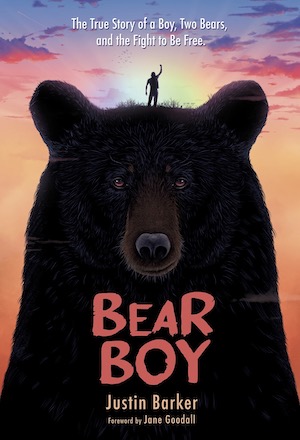In 1995, thirteen-year-old Justin Barker was begrudgingly browsing a used bookstore with his dad when he came across PETA founder Ingrid Newkirk’s Kids Can Save the Animals: 101 Easy Things to Do. Within days, young Justin learned about animal abuse on factory farms, went vegetarian, practiced his newfound phone advocacy skills, and started his own investigation of the Sacramento Zoo. This was the beginning of Justin’s career as a teen activist, which would soon bring global attention to his advocacy for Ursula and Brutus—two bears stuck in a small cage in Roseville, California.
Bear Boy: The True Story of a Boy, Two Bears, and the Fight to Be Free is Justin Barker’s powerful memoir for young adults about his years-long battle to save Ursula and Brutus. Barker writes with refreshing candor about the ups and downs of the activist experience—as well as the American teenager experience—and his memoir is a motivating read for teens and adults alike. As Jane Goodall writes in the forward, Bear Boy “will encourage young people to follow their dreams, to work hard to achieve a goal no matter how often they are told it is impossible.”

The story begins with Justin as a lovably petulant thirteen-year-old who is quick to fight with his parents and is looking forward to a summer of watching TV by himself. Reading Kids Can Save the Animals changes his summer plans—and his life—as his investigation of the Sacramento Zoo helps him grow his activist network and hone new media advocacy skills. Soon the Animal Protection Institute is giving him office space to work out of, and Justin is founding his new organization Citizens Lobbying for Animals in Zoos (CLAZ) as an eighth grader.
Right away, thirteen-year-old Justin sees himself in the plight of zoo animals: “I, too, was trapped in a place I didn’t want to be, enclosed by gender stereotypes and surrounded by bullies, with no end in sight.” Barker writes about the pain and confusion of being called “a fag” and the frustration of being bullied in school for being different. He seamlessly interweaves his journey to save the bears with his journey to embrace his queer identity. Barker notes that this was the nineties—“before Ellen came out”—and not a particularly safe culture for LGBTQIA+ youth. It’s not until he’s well into his teen activist fame that young Justin hears the letters LGBTQ together for the first time and finds a community of fellow queer students who accept and celebrate him.
In many ways, celebration is exactly what Bear Boy is about. It’s about celebrating the small actions that inspire larger actions, the little wins that grow into big wins. It’s about celebrating yourself for who you are and for every step you take toward living your values. It’s also an ode to growing up in the nineties. Young Justin dreams of being on Nickelodeon and he loves the Spice Girls as much as he loves Jane Goodall. “Their fashion sense was out of this world,” Barker writes about the Spice Girls, “and they looked like they were having more fun than anyone on earth…Their messages of camaraderie, self-love, and girl power were exactly what I needed.”
Barker’s tone is candid and often funny. There are entertaining moments like his omnivore dad saying, “New house rule. No quoting PETA at the dinner table.” And 10th grade Justin greets his classmates in the new school year with classic teenage aplomb: “I didn’t feel like I was better than them. I just felt above all their petty bullshit.”
The frankness Barker writes with is the frankness of his activism: Something’s wrong and the mayor can fix it? Call the mayor. The mayor doesn’t answer? Call again (and again, and again). The mayor finally answers but he won’t help? Tell a reporter about it. In a society in which animal rights issues are still viewed as murky territory at best, it’s refreshing to journey alongside a person who views the plight of animals as a clear-cut problem with a clear-cut solution.
Justin takes his initiation into disillusionment in stride, learning the realities of how the world works as he fights to garner support and raise a quarter of a million dollars to move Ursula and Brutus into a healthy environment. A zoo director threatens to sue him, and a mayor who hangs up on him is quoted in an article as saying he’s being responsive to Justin’s requests. “That was another thing I learned about adults,” Barker writes. “[T]hey weren’t so different than kids in their willingness to lie to get what they want.” Justin turns to more seasoned activists for support and is compassionately advised to get comfortable with rejection and failure.
With seemingly boundless resilience and an enviably pragmatic approach, Justin perseveres in his fight for the bears and he learns many valuable lessons along the way. “It was unbelievable that by asking the right questions, working hard, and insisting that people pay attention I could actually have an impact on the world.”
Bear Boy is not only an inspiring read about standing up for the voiceless; it also clearly evidences how standing up for the voiceless makes a tangible difference. Anyone feeling overwhelmed about the world’s gamut of social justice issues and environmental crises can take heart: big change does come about as a result of small, actionable steps by individual people—and it can all begin with a book.
Lillie Gardner is a writer based in St. Paul, Minnesota. Her work has been published in Quail Bell Magazine, Delmarva Review, Long River Review and more. She’s also an essays reader for Hippocampus Magazine and a contributor at Feminist Book Club.

